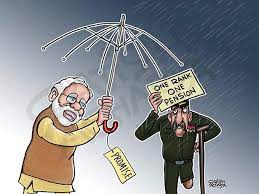
One Rank One Pension

6 people are having a discussion on the topic (Aarav, Jasmit, Suman, Smriti, Vishal, Anurag).
Group Discussion Starts
Aarav: Hello friends, as per the topic of discussion, we will be discussing on the One Rank One Pension scheme that was much in news few months back. So let us first unveil, what is One Rank One Pension or OROP as it is often said? OROP is the proposed and then implemented scheme by government in favour of demand of the ex-army man. It is under action from April 1, 2014 from which each army man will get same compensation in the form of pension based on their ranks.
Jasmit: Yes, this is the actual meaning of OROP. So let’s first make the process more systemic. Let us start by discussion the pros and cons and the various facets undertaken for the demands by the ex-army personnel’s. Furthermore we can discuss the recommendations and differences in government and ex-army man’s issues and we can also discuss its current status in the country.
Suman: So as it’s already mentioned, each retired army men of same rank will get same pension after their retirement. Practically speaking this is a much credible demand because the army men are the real soldiers who serve for their country and since military services requires fitness at its best, so their tenure is quite less, generally till 35 years only, which if compared to normal civilians is very less. So I feel that why they demanded is quite acceptable.
Smriti: Also the previous pension payment had issues related to maintaining the parity of paying pension based on ranks. The army men who retired earlier but at the same rank were getting less pension amount compared to the army men who retired today. For example, the army men who retired at the position of Colonel, after the sixth pay commission will get a higher pension then those Colonels who retired after third pay commission. So the ex-army men agitated against this disparity and demanded equality based on ranks.
Suman: But since the OROP offer is accepted by the government now, but still the army men are unhappy and under resentment as they feel that government accepted what they want but also rejected major parts.
Jasmit: Yes, the government accepted the fact of providing equal pension based on rank to all military retired servants from April 1, 2014 and in the clause they have kept the provision of revising it every 5 years. But the retired military officials are still not happy with it as they demanded revising the pension every 2-3 years as revision on shorter duration is a need according to them.
Vishal: it could be so, but I think we are overlooking some parts from the financial and administrative aspects. The implementation of this scheme requires paying pension to some army officials who retired even before independence and according to the committee setup, around Rs.8200 crore of financing is required to pay the pension only for the first time.
Smriti: Yes, also there are administrative and logistic issues. There are some an army man who retired before 1940s and is it practically impossible to have such older records of their ranks and positions they were appointed and got retired at that time. Also the government has lost/is unable to find some of the records because of which there are still chances of unequal distribution to happen again while setting up this scheme.
Jasmit: I feel that these financial and operational issues are something that can be catered with proper cooperation and proper management. And these issues are much smaller compared to the hardships they pass through while serving in the times of their youth, for the country and
Anurag: But there are still more problems also which the government may face. There are some legal issues where in according to the legal act of Pension Plan which is applicable to all the citizens of India who served as government employees, is violated under the implementation of OROP. The pension plans set by law are applicable to all the citizens and under the implementation of OROP, there has to undergo various legal amendments also which in itself is a time taking and complicated process.
Vishal: I agree with this fact. Also when the committee was setup to research on this, it was found that pension needs to be given based on equality of service as per the demand, but it is judged based on two components i.e. rank and length of service. Here the length of service is an issue, as the person who just reached a rank and gets retired will also get the same pension as the person who has been serving at that rank since longer duration.
Aarav: Yes, in fact I feel that the ex-army men, who served for us and the country deserve what they demand but it is also a fact that the adjustment and the settlement should be done on both the sides, i.e. ex-army men and the government itself for the betterment of both and the country as whole.


